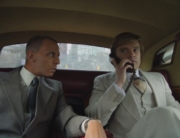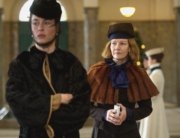Bohemian Rhapsody tells on a grandiose scale, with meticulous detail and inspired Easter eggs, the journey of the internationally popular British 1970s glam rock band Queen and its larger-than-life lead singer, Freddie Mercury. The rise of the group, the internal conflicts, and a conclusion at the legendary Live Aid set are all here. It’s a highly colorful celebration of everything Queen, from impeccable costume design right down to the retro Pepsi cups on top of the piano, as seen during the historic 1985 concert.
Flawless is an understatement when observing Rami Malek’s casting and extraordinary performance. He breathes and owns the role of Mercury. When the singer first meets the band’s manager, Malek does a quick but particular and subtle mouth movement that is frighteningly accurate. It’s as if Mercury himself has risen from the grave, possessed Malek, and said in trademark champion spirit: “No one can tell me story, but myself.” Gwilym Lee as Brian May couldn’t have been told apart from the real-life May either, and whoever thought of casting Mike Myers, in an ironic wink to Wayne’s World and its use of the operatic “Bohemian Rhapsody,” deserves high praise. I can’t remember the last time I saw such smart casting choices in a biopic.
Sure, it has its usual share of rock band bio tropes like the backstabbing, the simplifying of events, the declarative dialogue, and the script’s mistake of not giving enough background regarding Mercury’s eccentricities or aspirations. It’s not that the movie needed to leave no stone unturned, but the lecturing by friends over Mercury’s behavior feels like an uncalled, squeezed in intervention toward the end.
If the 134-minute length seems too long at times, the studio sessions sequences repetitive, or if the final Live Aid performance goes on forever and the end credits just can’t seem to let go, remember that what the filmmakers have set out to do is to make THE definitive Queen movie and immortalize Mercury. It was made to confirm that Mercury really was the heart of Queen. (In 2013, Sacha Baron Cohen’s departed from playing the lead singer over a dispute with the real-life band members for wanting to change the main focus toward the group, instead of the iconic singer.)
A scene near the end occurs right after Mercury has been diagnosed with AIDS. The entertainer exits down a long hospital hallway, with heavenly light pouring through the windows accompanied by a heart-warming synthesizer score in the background (provided by John Ottman), when he is stopped by another young AIDS patient, who wails a musical chant to Mercury, made popular at his concerts, “Eh oh,” as if to say “Is the show going to go on?” Mercury sings back with a shorter sung response, which one can interpret as a way of saying, “Yes, brother.”
That exchange alone is the epitome of the movie’s ambition to be more than a simple biopic. Two very different people, one a world star and the other, a regular person, fraternizing as two equals fighting the same disease. The achievement of this moment made me believe that this movie is not just about the life of Queen, it’s about the culture that made the band.







Leave A Comment